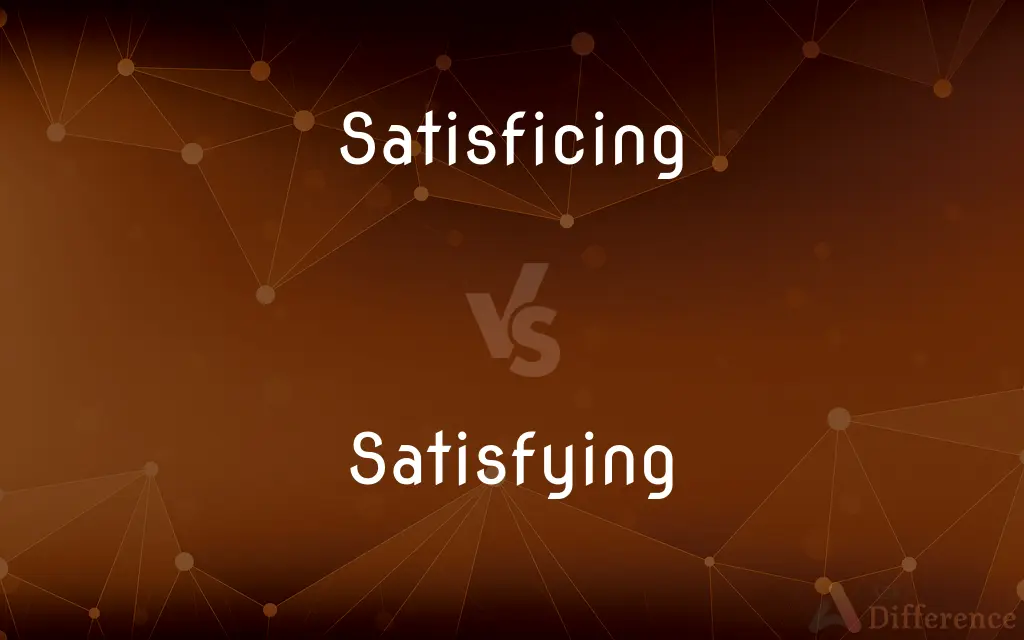Satisficing vs. Satisfying — What's the Difference?
By Maham Liaqat & Urooj Arif — Updated on May 5, 2024
Satisficing involves making a decision that meets an acceptable threshold, whereas satisfying refers to fulfilling needs or expectations completely.

Difference Between Satisficing and Satisfying
Table of Contents
ADVERTISEMENT
Key Differences
Satisficing is a decision-making strategy where the choice made needs only to meet a minimum acceptable level, rather than finding the optimal solution. In contrast, satisfying implies a condition or state where all requirements or desires are completely met, leading to a sense of fulfillment.
In satisficing, the focus is on adequacy rather than perfection, aiming to achieve a satisfactory solution quickly and with minimal effort. Whereas, satisfying involves achieving the best possible outcome that completely fulfills the criteria or expectations set forth.
The concept of satisficing is often used in scenarios where time is limited, and resources are constrained, making it impractical to search for the best option. On the other hand, satisfying is ideal in situations where resources and time are abundant, allowing for thorough exploration and choice.
Satisficing is commonly applied in cognitive psychology and behavioral economics to describe human decision-making behaviors that are not always rational by classical economic standards. Conversely, satisfying is a more general term applicable in various contexts like customer service, personal relationships, and product design, emphasizing total fulfillment.
The term satisficing was coined by Herbert A. Simon to describe a more realistic way of decision-making in complex situations, recognizing the limitations of human rationality. Satisfying, however, is a broader term, encompassing a wide range of experiences and industries, highlighting the achievement of completeness or wholesomeness.
ADVERTISEMENT
Comparison Chart
Definition
Making a decision that meets minimum criteria.
Fully meeting or exceeding expectations.
Focus
Adequacy and efficiency.
Completeness and perfection.
Application
Decision-making under constraints.
Broad applications in services and products.
Origin
Coined by Herbert A. Simon in economics.
General English usage.
Psychological Basis
Often irrational, based on limited information.
Aims for rationality and maximum fulfillment.
Compare with Definitions
Satisficing
A decision-making process aiming for adequacy rather than the best outcome.
Choosing the first acceptable option in a search to save time is an example of satisficing.
Satisfying
Associated with feelings of pleasure and contentment.
Watching a satisfying ending to a movie makes viewers happy.
Satisficing
Prioritizing speed over perfection in decision-making.
Satisficing during emergencies often results in faster responses.
Satisfying
Achieving complete fulfillment of needs or desires.
A satisfying meal leaves no room for hunger.
Satisficing
Employed often under resource constraints.
Satisficing is common in budget-limited projects.
Satisfying
Used broadly across various contexts.
Ensuring a product is satisfying in terms of quality and functionality is crucial for customer satisfaction.
Satisficing
Adapting expectations to current options rather than seeking the best.
Settling for a nearby restaurant because it's good enough shows satisficing.
Satisfying
Meeting or exceeding expectations thoroughly.
Delivering a project that not only meets but exceeds client expectations is satisfying.
Satisficing
Making choices based on a set threshold of acceptability.
Buying a house that meets basic requirements instead of exploring every option exemplifies satisficing.
Satisfying
Often related to emotional and psychological fulfillment.
A satisfying career provides both financial and emotional rewards.
Satisficing
Satisficing is a decision-making strategy or cognitive heuristic that entails searching through the available alternatives until an acceptability threshold is met. The term satisficing, a portmanteau of satisfy and suffice, was introduced by Herbert A. Simon in 1956, although the concept was first posited in his 1947 book Administrative Behavior.
Satisfying
To fulfill the need, desire, or expectation of
Were you satisfied with the hotel's service?.
Satisficing
Present participle of satisfice
Satisfying
To fulfill (a need or desire)
The cold drink satisfied my thirst.
Satisficing
Satisfying and sufficient
Satisfying
To free from doubt or question; convince
His explanation satisfied the authorities.
Satisfying
To provide sufficient explanation to dispel or answer (a doubt or question).
Satisfying
To meet or be sufficient for (a requirement); conform to the requirements of (a standard, for example)
Only two people satisfied the researcher's profile for the study.
Satisfying
To discharge (a debt or obligation, for example) in full.
Satisfying
To discharge an obligation to (a creditor).
Satisfying
To make reparation for; redress.
Satisfying
(Mathematics) To make the left and right sides of (an equation) equal after substituting equivalent quantities for the unknown variables.
Satisfying
To be sufficient or adequate.
Satisfying
To give satisfaction.
Satisfying
That satisfies, gratifies or pleases; that removes any feeling of lack.
Satisfying
Pleasing to certain sensory#Adjective channels in neurocognition#Noun, especially auditory#Adjective and tactile#Adjective ones synesthetically via ASMR.
Satisfying
Giving pleasure or satisfaction
Satisfying
Providing abundant nourishment;
A hearty meal
Good solid food
Ate a substantial breakfast
Satisfying
Providing freedom from worry
Common Curiosities
Is satisficing a rational decision-making process?
Satisficing can be considered rational within the context of limited time and resources, where searching for the optimal solution is impractical.
Can satisficing lead to a satisfying outcome?
Yes, satisficing can lead to a satisfying outcome if the decision meets the necessary requirements for the decision-maker's contentment.
What does satisfying mean?
Satisfying means fully meeting or even exceeding one's expectations or needs, resulting in complete contentment.
In which fields is satisficing particularly relevant?
Satisficing is particularly relevant in fields like behavioral economics and cognitive psychology, where decision-making processes are studied.
How does customer satisfaction relate to satisficing and satisfying?
Customer satisfaction can be achieved either by satisficing, where minimal requirements are met, or by satisfying, where customer expectations are fully exceeded.
How do satisficing and satisfying differ in decision-making?
Satisficing is about choosing an option that is "good enough" under the circumstances, while satisfying involves finding the best possible choice.
Why might someone choose satisficing over satisfying?
Someone might choose satisficing over satisfying to save time or resources, or when the effort of finding the optimal solution does not justify the potential benefits.
What is satisficing?
Satisficing is a decision-making process where the decision made needs only to meet minimum standards of acceptability.
What are the risks of satisficing?
The main risk of satisficing is that the chosen option may not fully address the problem or need, potentially leading to issues later.
How can businesses use the concept of satisfying in marketing?
Businesses can use the concept of satisfying in marketing by emphasizing how their products or services exceed customer expectations and deliver superior experiences.
Share Your Discovery

Previous Comparison
Heartwood vs. Sapwood
Next Comparison
Orientation vs. SeminarAuthor Spotlight
Written by
Maham LiaqatCo-written by
Urooj ArifUrooj is a skilled content writer at Ask Difference, known for her exceptional ability to simplify complex topics into engaging and informative content. With a passion for research and a flair for clear, concise writing, she consistently delivers articles that resonate with our diverse audience.













































